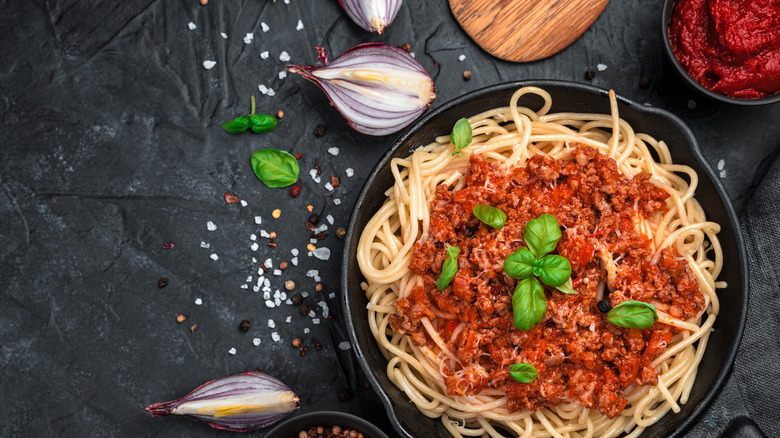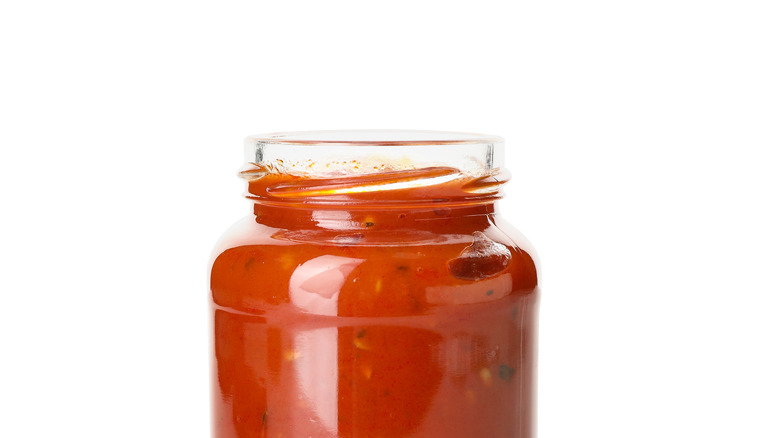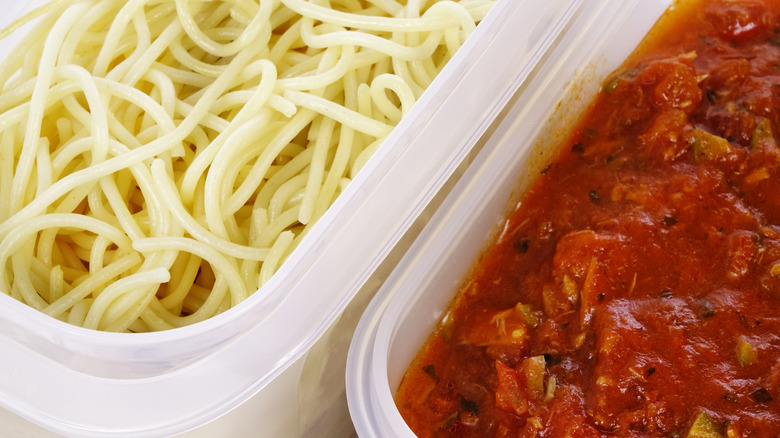How To Know If Spaghetti Sauce Has Gone Bad
If there's ever a saving grace ingredient in your fridge or pantry, it would be the spaghetti sauce. It's perfect to rustle up a quick dinner of pasta and ground beef, or even to add depth to a simple chicken curry.
Spaghetti sauces come in a variety of different kinds. There are ones made using tomatoes, which are the most common kind you'd find at the store, and there are alfredo sauces which are cream-based, per Lacademie. You may have also noticed marinara sauces with wine in them. Originating in Naples, Italy, the humble spaghetti sauce has a colorful history (via Spice Station Silverlake). Interestingly, tomatoes were initially thought to be toxic by natives, and only became popular as food in the 19th century.
A frequent conundrum with a jar of spaghetti sauce is that there always seems to be more than what you need for a single session of cooking, especially if you belong to a smaller household. You might be wondering if throwing the sauce in the fridge for later use is going to keep it fresh and also how to tell if the spaghetti sauce has gone bad.
These are the signs spaghetti sauce has gone bad
While unopened cans can be kept and used up to a yera past their expiration date, when it comes to opened jars of spaghetti sauce, the directions by the manufacturer might be a good place to start, Eat By Date. They can vary depending on the brand and kind of sauce. However, there are other determinants like if the sauce was homemade or store-bought and if it was left out at room temperature before going in the fridge, according to Food Champs.
There are also some warning signs to look out for before you use that opened can of spaghetti sauce. A change in color and texture might be the first sign you see, per Lacademie, although you won't need to throw it in the garbage just yet. If your sauce has turned from red to a darker shade and if the texture has become denser, that means it's losing its quality, so you might want to use it soon. Definite signs of decay, however, will manifest as mold (green or white) on the surface or lid, white fluid sitting atop the sauce, and a putrid smell once you open the lid.
Although tomato-based spaghetti sauces take longer to spoil because of the inherent acidity in the product (via Pasta Evangelists), the telling signs are a good indicator for when they've gone bad. Homemade sauces might spoil faster because they don't contain preservatives.
How to properly store spaghetti sauce
When it comes to storage, for starters, you might be wondering what the expiration date is indicative of on your jar of spaghetti sauce. The "best by" date is not so much an estimate of how long it takes for the unopened sauce to go bad as much as it is a message about how long you can keep the can till the sauce starts to lose its quality, reports Still Tasty. At room temperature, you can hope to get the best taste from the sauce for even more than a year.
With an opened can, you're going to want to get the sauce in the fridge right away to retain freshness, recommends Food Champs. Any time the sauce spends sitting on a counter at room temperature is an invitation for bacterial activity. Once in the fridge, the spaghetti sauce should remain fresh for 3-10 days, per Cully's Kitchen. If you want a longer life out of your sauce, you can transfer it to an air-tight jar and place it in the freezer for many months, according to Food Champs. Freezing is also an option with homemade spaghetti sauce; you can get 6 months of use with it provided it's free of dairy (via Martha Stewart).
Whether you're heading to the store to buy celebrity chef Ina Garten's favorite sauce or attempting to cook up a batch at home, follow these storing tips so you can enjoy your spaghetti sauce for longer.


